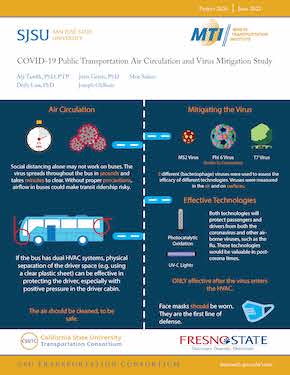- 408-924-7560
- mineta-institute@sjsu.edu
- Donate
COVID-19 Public Transportation Air Circulation and Virus Mitigation Study
COVID-19 may have forever changed our world. Given the limited space and air circulation, potential infections on public transportation could be concerningly high. Accordingly, this study has two objectives: (1) to understand air circulation patterns inside the cabins of buses; and (2) to test the impact of different technologies in mitigating viruses from the air and on surfaces inside bus cabins. For the first objective, different devices, metrics and experiments (including colored smoke; videotaping; anemometers; pressure differentials; particle counts; and 3D numerical simulation models) were utilized and implemented to understand and quantify air circulation inside different buses, with different characteristics, and under different operating conditions (e.g. with windows open and shut). For the second objective, three different live prokaryotic viruses were utilized: Phi6, MS2 and T7. Various technologies (including positive pressure environment inside the cabin, HEPA filters with different MERV ratings, concentrated UV exposure with charged carbon filters in the HVAC systems, center point photocatalytic oxidation technology, ionization, and surface antiviral agents) were tested to evaluate the potential of mitigating COVID-19 infections via air and surfaces in public transportation. The effectiveness of these technologies on the three live viruses was tested in both the lab and in buses in the field. The results of the first objective experiments indicated the efficiency of HVAC system designs, where the speed of air spread was consistently much faster than the speed of air clearing. Hence, indicating the need for additional virus mitigation from the cabin. Results of the second objective experiments indicated that photocatalytic oxidation inserts and UVC lights were the most efficient in mitigating viruses from the air. On the other hand, positive pressure mitigated all viruses from surfaces; however, copper foil tape and fabrics with a high percentage of copper mitigated only the Phi6 virus from surfaces. High-temperature heating was also found to be highly effective in mitigating the different viruses from the vehicle cabin. Finally, limited exploratory experiments to test possible toxic by-products of photocatalytic oxidation and UVC lights inside the bus cabin did not detect any increase in levels of formaldehyde, ozone, or volatile organic compounds. Implementation of these findings in transit buses, in addition to the use of personal protective equipment, could be significantly valuable for protection of passengers and drivers on public transportation modes, possibly against all forms of air-borne viruses.
ALY M. TAWFIK, PHD, PTP
Dr. Tawfik is an associate professor of transportation systems engineering and founding director of the Transportation Institute at California State University, Fresno. While his area of expertise includes modeling, simulation and optimization of individual travel behavior and of transportation systems, he has a particular passion for transportation sustainability and the future of transportation. He is active on research projects and grants focusing on travel data innovations, GIS applications in transportation, and using technology to minimize commute footprints. His other research projects focus on automated transportation systems, particularly shared autonomous vehicles (SAVs). He serves on local, national and international transportation boards and committees. He is the author of many peer reviewed publications, and has given keynote presentations in local, national and international conferences.
DEIFY LAW, PHD
Dr. Deify Law is an associate professor in the Department of Mechanical Engineering at California State University, Fresno. Dr. Law received his Doctoral degree in mechanical engineering from Virginia Tech and both Master and Bachelor of Science degrees in mechanical engineering from Iowa State University. Dr. Law’s research focus is in the area of simulations and measurements of transport phenomena such as two-phase bubbly flows, single-phase fluid flows, and convective heat transfer. Fluids-related applications include building and transportation air ventilation for health and safety and aerodynamic drag reduction for improving fuel efficiency and convective heat transfer enhancement.
JURIS GRASIS, PHD
Dr. Grasis is an assistant professor at UC Merced. He leads a research team focusing on viral metagenomics, systems immunology, microbiome regulation, and viral/antiviral discovery. Dr. Grasis completed his Ph.D. in Adaptive Immunology in 2009, his post-doctoral training in Host-Microbiota Interactions and Viral Metagenomics in 2015, and started his lab at UC Merced in 2018. He teaches undergraduate and graduate-level virology courses and started the HHMI funded SEA-PHAGES course at UC Merced in 2019-2020.
JOSEPH OLDHAM
Mr. Oldham is currently the Transportation Project Developer/Grant Writer for Fresno Metro Ministry in Fresno with a focus on developing sustainable transportation solutions and resources for communities of color. Previously, Mr. Oldham was the Director for the CALSTART San Joaquin Valley Clean Transportation Center; a position he held for five years. Prior to that, Mr. Oldham was the Sustainability Manager for the City of Fresno and is a graduate of California State University, Fresno.
MOE SALEM
Mr. Salem is the Co-Founder and the CTO of AIR2O Cooling LLC. Mr. Salem has a B.Sc. in Mechanical Engineering and a Diploma of Business Administration. He serves as capacity of CTO (Chief technical Engineer & Consultant) for Air2O Cooling LLC. He holds many patents for the Indirect/Direct Evaporative cooling technology as well as the control Systems for its Hybrid operations. Mr. Salem has over 20 Years of Experience in the HVAC field as well as experience in the sustainable energy saving solutions for HVAC and energy recovery systems. Mr. Salem is one of the pioneers of the outdoor cooling systems. He was the head of the design team for one of the largest outdoor cooling projects in the world (Universal Studio Singapore Theme Park).
-
Contact Us
San José State University One Washington Square, San Jose, CA 95192 Phone: 408-924-7560 Email: mineta-institute@sjsu.edu






